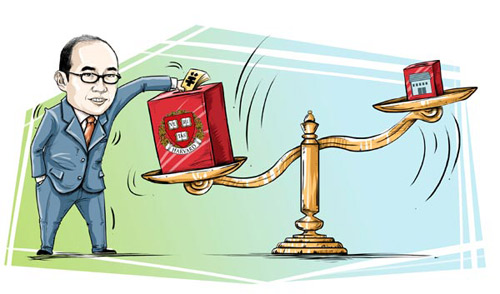|
查看原文
A Chinese property baron has sparked a debate about the worthiness of charity recipients, writes Raymond Zhou.
Philanthropy is generally not a hotbed for controversy. But here in China you are watched closely if you hold your purse strings tight or let your money flow, and, in the latest case, the direction in which your money flows may also be a cause for concern.
Pan Shiyi, a real estate tycoon who is a celebrity in his own right, ruffled feathers when he and his wife decided to donate $15 million to Harvard University in the United States.
The news on the grapevine was more dramatic: It said Pan gave $100 million. Later, he clarified that, saying he planned to set up a fund with a total of $100 million, of which $15 million is earmarked for Harvard, and specifically for needy students from China. Other schools being considered include Yale and other prestigious universities in the US and the UK.
Yao Shujie, an economist, spoke for many when he questioned Pan's motives: "Pan made his fortune from the property market in China. Why should he go all the way to the US for philanthropy? He forgot where his roots are."
Others suggested that Pan's donation was an effort to win admission for his son into the Boston school. Their rationale: the benchmark set by Pan for eligibility is 65,000 yuan ($10,500) in annual family income, which most middle-class Chinese families can easily cross and, therefore, not many from China will meet this requirement anyway.
Now, Pan is no Chen Guangbiao, a philanthropist who made his millions in recycling. Pan has dabbled in entertainment, even playing the male lead in a feature film, yet he does not go around trumpeting his altruistic deeds. He does have a much higher profile than most businessmen in China, but he earned it not from his business feats, but rather from his micro blog comments on public affairs.
As a matter of principle, Pan has the right to donate to whichever individual or organization he sees fit. It is none of the outsider's concern whether the recipient is Chinese or foreign. Every person has his or her own priorities when it comes to choosing a target for help.
Most Chinese now totally get this. Had this happened a decade or two ago, public feedback would have been predominantly negative, I'm certain, because most would have equated such an act with a lack of patriotism. This feeling still lingers, but it's shared by fewer and fewer people because the public can more easily understand the distinction between public and private rights.
A few years ago, Zhang Lei, a Chinese financier, donated $8.88 million to Yale University, his alma mater. Had he been better known, he would have borne the brunt of a major ill-will campaign.
Detractors, for all their misplaced zeal to dictate private citizens' choice of charity, do apply a crude principle of economics when they see something like that. For a school such as Harvard, they reason, this money is the icing on the cake. It has so many donors that Pan's money would not yield the highest return on investment, if it is seen as an investment.
Ordinary Chinese do not use calculus to figure out which school needs donations the most, but we do have two colorful sayings that correspond to the rule of microeconomics: "Adding flowers to a big bouquet", and "Sending charcoal to someone trapped in snow." You get more bang for your buck if you do the latter, but that will require independent thinking.
Most investors, professional or otherwise, would follow the herd mentality and chase objects everyone else is already hotly pursuing. You would feel you have rubbed off some of the glitter if you give money to Harvard or Tsinghua University in China. In fact, the top universities in China get proportionately much more in both private donations and public funding. They are the largest, most-prominent bouquets in the garden of higher education, and throwing roses or petals at them would probably yield more psychological returns than tangible ones.
By this yardstick, the problem with charity recipients is not their nationality, but rather which is in dire need of such help. Harvard may have a much larger budget than Tsinghua, which, in turn, is much better funded than a regular college in China. The ones most worthy of such financial assistance, as the logic goes, are those in poverty-stricken areas that cater to the lowest-income families.
As I gather from empirical evidence, this social stratum is given short shrift and deserves a strong and consistent inflow of funding. Education, if it be the great equalizer, should give students from underprivileged families equal opportunities so they can make a fresh start with their lives. But philanthropy alone is unable to solve this problem. It has to be from the State, which is implementing all kinds of programs for that purpose, but there is still great room for improvement.
A year ago, a photo surfaced online of a father carrying a desk to school for his daughter. It outraged the country. Shouldn't this be the responsibility of the local education authority, not the parents? Only in those areas not covered by the State can philanthropists fill the void.
There are many grassroots programs. The one that provides free lunches is especially touching because it funds students who can barely pay for their meals. The money provides a slightly better diet, and the students get a higher level of nutrients when their bodies need them most.
One can question which is the better economic choice: a large sum for a world-renowned institution or a similar sum that may benefit tens of millions of hinterland children. If you push the argument further, you will realize that there are youngsters who suffer from even worse poverty and misery. They may not be in a country you are familiar with, but the same amount of money may be able to make a greater difference to their lives than in a Chinese backwater.
However, that is just one way of calculating the worthiness of a recipient. You can also use a different gauge and see how much money is wasted in overheads or on unnecessary expenses. And you may choose a recipient that is better managed and yields the least waste in the process.
Then there is the possibility of using philanthropy as a public relations tactic - to smooth the wrinkles of business dealings or boost one's personal image. If handled deftly, such a fusion of business and non business strategies would not raise eyebrows. If Chinese businesses have an eye for the global market, why not non business affairs, such as charities? Shouldn't one expand his or her horizon to that of the whole world?
I don't want to second-guess the motives behind Pan Shiyi's decision to fund Ivy League-bound Chinese students. He has made many donation to poor children in China's inland provinces. He may see the new move as helping those on the verge of success and the schools as incubators for tomorrow's leaders. Zhang Xin, Pan's wife, says: "I want the best students to receive the best education, regardless of whether their families can fund it."
By Raymond Zhou (China Daily)
|
查看译文
据《中国日报》报道,近日,中国房地产大亨潘石屹捐助哈佛大学中的中国寒门学子一事,引发网上热议不断。
通常来说,慈善往往不会成为唇枪舌战之地。但在中国,如果你把钱看得太紧,或是大笔花钱,你都会被别人紧紧盯上。就拿最近的例子来说,就连你资金的流向也可能成为大家关注的焦点。
潘石屹是房地产大亨,同时也称得上是位名人。当他与妻子决定向美国哈佛大学捐款1500万美元时,却引起了公愤。
有的小道消息更为离奇了,称潘石屹共捐了1亿美元。随后,他出面澄清,表示自己计划设立总价值1亿美元的“SOHO中国助学金”,其中的1500万用于捐助在哈佛就读的中国寒门学子。耶鲁等其他英美著名学府也在其考虑之列。
经济学家姚树洁质疑潘石屹的捐款动机,似乎想替很多人打抱不平:“潘石屹搞房地产,在中国这片土地上爆发横财。为什么要大老远跑去美国做慈善,他富得忘了自己的皮肤是黄的。”
其他人则认为潘石屹的捐款是为其子将来入读波士顿名校“买门票”。这些人的原理是:潘石屹给助学金所设置的门槛是每年6.5万元(1.5万美元)的家庭收入,而大部分的中国中产阶级家庭年收入绝不止这一数字。这么看来,并不是很多中国学子能达到这一要求。
潘石屹不像陈光标那样靠发展回收经济致富。潘涉足娱乐业,甚至还在电影《阿司匹林》中担任男一号,他从事善行时,不会高调宣传,比大部分的中国企业家都低调地多。但是,他的知名度并非源于商业上的丰功伟绩,而是因其在微博上对社会事件作出的评论。
原则上,潘石屹有权利决定把钱捐给什么人或是什么机构合适。至于受助者是中国人还是外国人,与外人无关。每个人在选择援助对象时都有自己的优先考虑。
现在,大多数的中国人都能明白这一点。这要是发生在十年、二十年以前,我很确定绝大多数的公众舆论都会是负面的,因为他们会把这种行为上纲上线到缺乏爱国主义精神。现在虽然这种思想依旧存在,但已经越来越少了,因为人们更容易区分公共权利和私有权利之间的差别。
几年前,中国金融家张磊向母校耶鲁大学捐赠888万美元。他要是再出名些,他就会成为人们的众矢之的。
批评人士虽对别人的慈善选择是瞎操心了,但他们确实对此类事件用上了一个简单的经济学原理。他们推断,对哈佛这类的学校而言,这笔钱不过是锦上添花。他们的捐赠者多如牛毛,如果把潘的捐款看成是一种投资行为,他也不会获得最高的回报率。
普通中国人不会特意去计算哪所学校最需要捐款,但中国确实有两句俗语恰如其分地应和了这种微观经济学原理:“锦上添花”和“雪中送炭”。如果选择后者,你会更受关注,但这种做法需要自己的独立思考。
多数投资者,不论是专业人士还是外行人,都有从众心理去追逐那早已是众人争相追捧的事物。如果你把钱捐给哈佛大学或是中国的清华大学,你并不觉得有多么令人瞩目。事实上,中国顶尖大学收到的私人捐款或是公共资助都比其他学校多得多。它们好比是高等学府百花园中最耀眼的花束,向它们投掷玫瑰或花瓣时所获得的心理满足感很可能比有形回报来得多。
按这种标准来说,捐赠对象的国籍不是问题,问题在于谁真的急需帮助。哈佛大学可能比清华大学需要更多的预算,因此,它能比中国的常规大学得到更多的资助。按逻辑说来,最需要这种经济援助的,是那些供最低收入家庭就读的贫困地区学校。
从我的经验性实例看来,这种社会阶层并没有得到重视,而且需要持续强劲的资金援助。如果教育是优良的平衡器,那么它应该给予贫困学子平等的机会,好让他们开启新的人生。但光有慈善,仅是杯水车薪,解决不了问题。国家必须带头,实施促进教育公平的各个项目。而在这点上,努力的空间还很大。
一年前,一位父亲为女儿扛着课桌去学校的照片在网上出现,这让举国上下颇为愤慨。这难道不应该是当地教育局的责任,与父母何干?只有在这些国家遗漏的贫困地区,慈善家们才能填补空缺。
现在有很多基层项目。其中一个提供免费午餐的项目尤为令人感动,因为它资助了那些几乎吃不起饭的学生。这笔钱能为他们提供稍好一些的食物,也能让他们在长身体的时候获得更充足的营养。
你可以怀疑,哪种经济投资更为明智:是给世界知名学府捐赠巨款,还是用同样一笔钱捐助数千万身处腹地的孩子。如果将问题讨论地更深入一些,你就会发现有很多年轻人过着更穷苦的生活。你或许并不清楚他们所在国家,但同样一笔钱却可以让他们的生活发生翻天覆地的变化,这远比投资在中国荒僻之地来得更有意义。
不过,这仅仅是其中一种衡量受助者价值的方法。你还可以用其他不同的标准来计算,看看有多少钱浪费在了杂项开支或不必要的开支上。然后,你可以选择一个方便实施,善款最大化的援助对象。
慈善也有可能成为润滑公共关系的筹码——让商业交易变得更容易或提升个人形象。如果处理巧妙,这种商业与非商业策略的融合并不会引人侧目。如果中国商人有放眼全球市场的洞察力,又怎会不着眼于慈善类的非商业事务。他们难道不应该拥有全球视野吗?
对于潘石屹捐款常春藤名校中的中国学子一事,我不想做事后诸葛,揣测其动机。潘先生对中国内陆的寒门学子也做了很多捐款。他下一步要做的可能是捐助那些离成功仅一步之遥的学子和培养未来领袖的学府。潘石屹的妻子,张欣说过:“我想让最优秀的学生接受最好的教育,不管他们的家庭能否负担得起。”
作者:中国日报周黎明
(译者 samycai 编辑 丹妮)
扫一扫,关注微博微信
 
|

